Edmund Giambastiani
Edmund Peter Giambastiani Jr.[1] (born May 4, 1948) is a retired United States Navy admiral who served as the seventh vice chairman of the Joint Chiefs of Staff from 2005 to 2007. He retired in 2007, after 37 years of service.[2]
Edmund P. Giambastiani Jr. | |
|---|---|
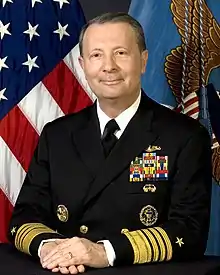 Giambastiani in February 2007 | |
| Born | May 4, 1948 Canastota, New York, United States |
| Allegiance | United States |
| Service/ | United States Navy |
| Years of service | 1970–2007 |
| Rank | Admiral |
| Commands held | Vice Chairman of the Joint Chiefs of Staff United States Joint Forces Command Allied Command Transformation, NATO Anti-Submarine and Reconnaissance Forces Atlantic Submarines Allied Command Atlantic Atlantic Fleet Submarine Force Submarine Development Squadron Twelve USS Richard B. Russell NR-1 Deep Submergence Craft |
| Battles/wars | Vietnam War |
| Awards | Defense Distinguished Service Medal (3) Navy Distinguished Service Medal (5) Legion of Merit (4) |
Early life and education
Giambastiani was born on May 4, 1948, in Canastota, New York. He graduated from the United States Naval Academy with leadership distinction in 1970.
Naval career
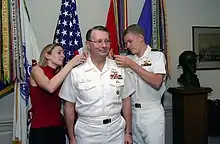
Giambastiani's operational assignments included several in which he was responsible for both demanding at-sea operations and the development of new technologies and experimental processes. Early sea assignments included USS Puffer (SSN-652) and the USS Francis Scott Key (SSBN-657)'s blue crew. While assigned to USS Puffer, he was a 1973 winner of the Fleet Commander's Junior Officer Submarine Shiphandling Competition. He commanded the NR-1 Deep Submergence Craft, the Navy's only nuclear powered deep diving ocean engineering and research submarine and USS Richard B. Russell, where the crew was awarded three consecutive Battle Efficiency "E"s, three Navy Unit Commendations, and two Fleet Commander Silver Anchors for excellence in enlisted retention.
Giambastiani also led Submarine Development Squadron Twelve, an operational submarine squadron that also serves as the Navy's Warfare Center of Excellence for submarine doctrine and tactics. Established in 1949, Submarine Development Squadron Twelve is the oldest experimental unit of its kind in the U.S. military. He served as the first director of strategy and concepts at the Naval Doctrine Command, as well as Commander, Atlantic Fleet Submarine Force; Commander, Submarines Allied Command Atlantic; and Commander, Anti-Submarine and Reconnaissance Forces Atlantic in Norfolk, Virginia.
Giambastiani's other shore and staff assignments include duties as an enlisted program manager at the Navy Recruiting Command Headquarters, Washington, D.C., in the early days of the all volunteer force; Special Assistant to the Deputy Director for Intelligence, Central Intelligence Agency; and, a fellowship with the Chief of Naval Operations' Strategic Studies Group. As a flag officer, he served as the Deputy Chief of Staff for Resources, Warfare Requirements and Assessments for the Commander, United States Pacific Fleet; Director of Submarine Warfare for the Chief of Naval Operations; Deputy Chief of Naval Operations for Resources, Requirements, and Assessments; and as the Senior Military Assistant to Secretary of Defense Donald H. Rumsfeld. His previous assignment was as NATO's first Supreme Allied Commander Transformation (SACT) and as Combatant Commander of United States Joint Forces Command, where he led the transformation of NATO and U.S. military forces, capabilities and doctrines and the introduction of new technologies, from October 2, 2002, to August 1, 2005.[3]
In 2003, in his capacity as Commander, United States Joint Forces Command, Giambastiani published a "lessons learned" report.[4] While generally praising U.S. performance it highlighted numerous incidents of friendly fire.
Vice Chairman of the Joint Chiefs of Staff
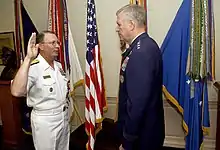
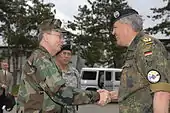
On August 12, 2005, Giambastiani was sworn in as the seventh Vice Chairman of the Joint Chiefs of Staff, becoming the third naval officer to hold that position.
As Vice Chairman, Giambastiani chaired the Joint Requirements Oversight Council, co-chaired the Defense Acquisition Board, and served as a member of the National Security Council Deputies Committee, the Nuclear Weapons Council and the Missile Defense Executive Board. In addition, he worked with the Deputy Secretary of Defense Gordon R. England as Co-Chair of the Deputies Advisory Working Group, which oversees implementation of the 2006 Quadrennial Defense Review and other high level Departmental business issues.
On May 4–6, 2007, Giambastiani visited Tunisia, meeting with high-ranking military and civilian officials, including his Tunisian counterparts and Tunisian Foreign Minister Abdelwaheb Abdallah and Defense Minister Kamel Morjane. He went to the North Africa American Cemetery and Memorial on the outskirts of Tunis to pay his respects to fallen U.S. soldiers who had died there during the Tunisia campaign of World War II.
On June 1, 2007, Giambastiani announced his retirement from the military to spend more time with his family and pursue other ventures.[5] He retired on July 27, 2007.[6]
Post-military career
Giambastiani's personal interests include amateur radio, for which he uses the call sign N4OC. He also currently serves as a guiding coalition member of the Project on National Security Reform. He also serves on the Advisory Board of Massachusetts Institute of Technology's Lincoln Laboratory and the Board of Trustees of the Mitre Corporation.
On October 8, 2009, airplane maker Boeing Co. announced that Giambastiani had been elected to its board of directors, effective immediately. The Seattle Times reported that "In a statement, Boeing chairman and chief executive Jim McNerney indicated that the addition of Giambastiani, who was the second-highest ranking officer in the U.S. military, is intended [...] to boost Boeing's influence with the Pentagon."[7]
Dates of rank
| Ensign | Lieutenant (junior grade) | Lieutenant | Lieutenant Commander | Commander | Captain |
|---|---|---|---|---|---|
| O-1 | O-2 | O-3 | O-4 | O-5 | O-6 |
 |
 |
 |
 |
 |
 |
| June 3, 1970 | September 3, 1971 | July 1, 1974 | September 1, 1978 | April 22, 1982 | September 1, 1989 |
| Rear Admiral (lower half) | Rear Admiral (upper half) | Vice Admiral | Admiral |
|---|---|---|---|
| O-7 | O-8 | O-9 | O-10 |
 |
 |
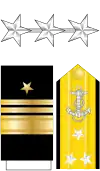 |
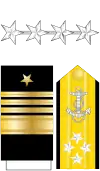 |
| October 1, 1995 | August 1, 1997 | May 6, 1998 | October 2, 2002 |
Awards and decorations
Medals and ribbons
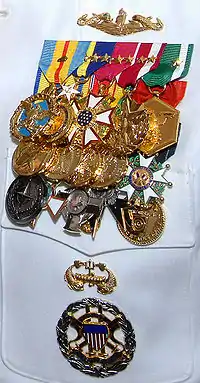
 Submarine Warfare insignia (Officer)
Submarine Warfare insignia (Officer) Deep Submergence insignia (Officer)
Deep Submergence insignia (Officer) Office of the Joint Chiefs of Staff Identification Badge
Office of the Joint Chiefs of Staff Identification Badge Office of the Secretary of Defense Identification Badge
Office of the Secretary of Defense Identification Badge
His decorations include numerous personal and unit decorations, medals and ribbons including:
References
- "Edmund Peter Giambastiani". Military Times. Sightline Media Group. Retrieved 2021-03-30.
- United States Navy (2007-04-15). "Admiral Edmund P. Giambastiani Jr.: Vice Chairman of the Joint Chiefs of Staff". United States Navy. Archived from the original on 2009-03-12. Retrieved 2011-10-15.
- "Admiral Edmund P. Giambastiani Jr., U.S. Joint Forces Command/North Atlantic Treaty Organization". United States Joint Forces Command. Archived from the original on 2007-09-28. Retrieved 2004-06-18.
- "hU.S. war review: Unprecedented coordination, but costly failures". USA Today. 2003-10-02. Archived from the original on 2022-06-11. Retrieved 2011-10-15.
Too little was done to minimize incidents of "friendly fire," or inadvertent attacks by U.S. forces on U.S. or coalition troops, according to Adm. Edmund P. Giambastiani Jr., chief of Joint Forces Command, which compiled the war review, known as a "lessons learned" report.
- Shanker, Thom (June 2, 2007). "Vice Chairman of Joint Chiefs Says He'll Retire in August". New York Times. Retrieved 2007-06-02.
- Miles, Donna. Vice Chairman Honored for Contributions, Service. American Forces Press Service. July 27, 2007.
- "Boeing adds former top admiral to board of directors". The Seattle Times. October 8, 2009.
- "Magyar Köztársasági Érdemrend középkeresztje". Embassy of Hungary. October 8, 2005. Retrieved 2008-02-25.
- Governor General of Canada, January 24, 2006
- "Kotkaristi I klassi orden". Estonia Government. February 2006. Archived from the original on 2008-03-16. Retrieved 2008-02-25.
- "NATO's first Transformation Commander bids farewell". NATO. August 1, 2005.
External links
- "Official JCS biography (This work is in the public domain.)". Archived from the original on 2008-01-29. Retrieved 2005-08-15.
- "Governor General announces awarding of Meritorious Service Decorations". Governor General of Canada. 2006-01-24. Archived from the original on 2008-03-17. Retrieved 2006-09-30.
- Appearances on C-SPAN